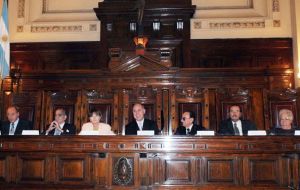MercoPress. South Atlantic News Agency
Clarin loses constitutional battle, but Argentine government ordered to treat all media equally
 The much expected Supreme Court ruling after four years of litigations.
The much expected Supreme Court ruling after four years of litigations. The Argentine Supreme Court on Tuesday after four years of litigation finally declared the constitutionality of the Broadcast Media Law, effective immediately, and which forces the powerful Clarin media consortium to comply with the antimonopoly legislation and sell off many of its operating licenses.
The Clarin group reacted immediately and a few hours later published a statement expressing “respect towards the ruling” but also considering future legal steps like appealing to international courts arguing that the principles of the Argentine constitution and the American Convention on Human Rights “have been contradicted”.
In a six to one vote, the majority of the Supreme Court supported the constitutionality of Media Law 26.522, with a dissident vote from the eldest member of the highest tribunal in Argentina.
In a 400 pages ruling the Court said that the deadline for disinvestment is over and thus Clarin must present its plan to begin with the process. However the Judges also underlined that “property rights of the licensees, still effective must be protected with compensations”.
The Audiovisual Communication Services Act “in that in general, regulates a multiplicity of licenses is constitutional because it is a faculty of Congress, and its convenience and opportunity are not a matter for Judges to analyze. Likewise the constitutional analysis is irrelevant to future conflicts that may arise because of the implementation of the bill which are the source of other legal actions”, said the Supreme Court.
Further on the Argentine highest court points out that freedom of expression, is among the freedoms enshrined in the Constitution, and one of the most powerful to the extreme that “without the needed protection only a nominal democracy would exist”. Equally significant media have a relevant role in helping public discourse and culture and thus the interest of the state in regulation is unquestionable. In this constitutional context a bill that sets a priori, general limits is legitimate since this way it favors freedom of expression by impeding concentration in the market“.
Regarding the disputed Article 45, the judges, six to one, supported its constitutionality since it establishes that private media with national audience can have a maximum 35% of the television market and equally a 35% maximum of cable television audience; 10 radio licenses; 24 of cable television and one satellite television.
On the issue of property rights, ”at the moment of sentencing it has not been proved that there is an affectation of freedom of expression“ and it ”has not been confirmed that the licenses regime established by the law risks its economic sustainability“.
Sustainability can't be equated with profitability, and to this respect ”in the very nature of the law's purpose of limiting concentration, the reduction in earnings of a corporation is a possibility“.
And it is not acceptable that only an economy of scale, as currently exists guarantees sufficient independence as to become a critical voice. There are numerous small and medium sized media involved in a critical role, and inversely there are large media concentrations that are condescending with the government in office, points out the ruling even when on this point it was not a tepid 4 to 3 vote.
The Judges also criticized Argentina's Federal Authority on Audiovisual Communications, AFCSA, for not acting on other groups and warning that it must be an 'independent' body and ”the law must be implemented respecting equality and due process“
The questioning of AFCSA by the Judges could open the way for another court battle between the Argentine government and the Clarin group, in the Administrative and Contentious court and referred to the implementation of the bill.
Likewise the Judges said that ”there must be transparent policies regarding government subsidies and publicity, and that state media must not be mere instruments in support of government policy or a way to eliminate dissident voices”.
The articles questioned by the Clarin group, 45 and 48 referred to the number of licenses and 41 and 161 to the disinvestment deadline. The implementation of the articles had been blocked by successive injunctions.
The Media law was sanctioned by the Argentine congress in 2009 and has since been in litigation between the government of President Cristina Fernandez and the Clarin group. Last August the Supreme Court convened both sides to a public audience in which both sides displayed their arguments and answered questions from the Judges.
Reacting to the ruling the Buenos Aires Stock Exchange decided to temporarily suspend transactions of Clarin shares amid a massive sell-off. Following the ruling, Clarin's shares fell 5.76% before trade in them was suspended. The bourse said the shares would be suspended until it had more information about the ruling.
Stock Exchange authorities are expected to issue a statement to explain the reasons of the decision and to inform when operations will be resumed. In London, meanwhile, shares of Clarin media group were plunging 21 percent.




Top Comments
Disclaimer & comment rules-

-

-

Read all commentsGame over
Oct 30th, 2013 - 08:48 am 0Clarin Miente lost and has to accept the rule of law like everybody else...
It is not the rule of law, it is censorship.
Oct 30th, 2013 - 09:30 am 0Avoiding media monopoly isn't censorship.
Oct 30th, 2013 - 09:43 am 0It's common sense.
Commenting for this story is now closed.
If you have a Facebook account, become a fan and comment on our Facebook Page!